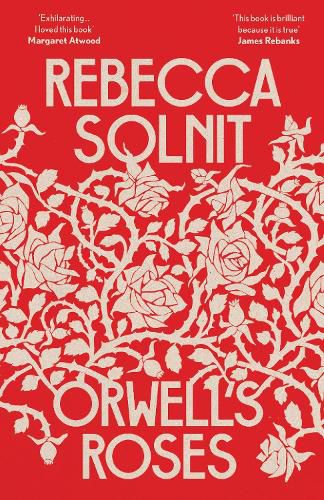Readings Newsletter
Become a Readings Member to make your shopping experience even easier.
Sign in or sign up for free!
You’re not far away from qualifying for FREE standard shipping within Australia
You’ve qualified for FREE standard shipping within Australia
The cart is loading…






Outside my work the thing I care most about is gardening - George Orwell
Inspired by her encounter with the surviving roses that Orwell is said to have planted in his cottage in Hertfordshire, Rebecca Solnit explores how his involvement with plants, particularly flowers, illuminates his other commitments as a writer and antifascist, and the intertwined politics of nature and power.
Following his journey from the coal mines of England to taking up arms in the Spanish Civil War; from his prescient critique of Stalin to his analysis of the relationship between lies and authoritarianism, Solnit finds a more hopeful Orwell, whose love of nature pulses through his work and actions. And in her dialogue with the author, she makes fascinating forays into colonial legacies in the flower garden, discovers photographer Tina Modotti’s roses, reveals Stalin’s obsession with growing lemons in impossibly cold conditions, and exposes the brutal rose industry in Colombia.
A fresh reading of a towering figure of the 20th century which finds solace and solutions for the political and environmental challenges we face today, Orwell’s Roses is a remarkable reflection on pleasure, beauty, and joy as acts of resistance.
$9.00 standard shipping within Australia
FREE standard shipping within Australia for orders over $100.00
Express & International shipping calculated at checkout
Outside my work the thing I care most about is gardening - George Orwell
Inspired by her encounter with the surviving roses that Orwell is said to have planted in his cottage in Hertfordshire, Rebecca Solnit explores how his involvement with plants, particularly flowers, illuminates his other commitments as a writer and antifascist, and the intertwined politics of nature and power.
Following his journey from the coal mines of England to taking up arms in the Spanish Civil War; from his prescient critique of Stalin to his analysis of the relationship between lies and authoritarianism, Solnit finds a more hopeful Orwell, whose love of nature pulses through his work and actions. And in her dialogue with the author, she makes fascinating forays into colonial legacies in the flower garden, discovers photographer Tina Modotti’s roses, reveals Stalin’s obsession with growing lemons in impossibly cold conditions, and exposes the brutal rose industry in Colombia.
A fresh reading of a towering figure of the 20th century which finds solace and solutions for the political and environmental challenges we face today, Orwell’s Roses is a remarkable reflection on pleasure, beauty, and joy as acts of resistance.
As a lover of Rebecca Solnit’s writing, I was thrilled at the prospect of her unique perspective on one of the most influential writers of the 20th century. And Solnit does not disappoint. Orwell’s Roses is only part-biography: Solnit exquisitely sheds light on a little-studied facet of Orwell’s life – a love of gardening – using this as a starting point from which to venture into the intersections of art, politics and nature, while always deftly orbiting back to her subject’s central concerns. ‘In the spring of 1936 a writer planted roses,’ she begins, referring to Orwell’s time at a cottage in Wallington, Hertfordshire. Solnit writes: ‘In an age of lies and illusions, the garden is one way to ground yourself in the realm of the processes of growth and the passage of time.’ Amid the politics, Orwell’s writing is laced with references to the natural world and delight in unremarkable beauty. Bread may feed the body, Solnit notes, but roses (art, pleasure) feed something deeper, a truth equally worthwhile.
Solnit’s writing then beautifully unfurls like petals from her central subject: Tina Modotti’s path from artist to exiled revolutionary; the atrocities of Stalin’s brutal regime; Jamaica Kincaid’s fierce writing around nature and colonialism; and Columbia’s cruel, exploitative rose industry. Circling back to Orwell, Solnit revisits Nineteen Eighty-Four and finds light among the grey in Winston Smith’s rebellious acts and his reveries on beauty – pleasure as resistance – even as Big Brother closes in around him. Throughout, Solnit – like Orwell – writes with clear-eyed precision and empathy for her subjects, an elegant marriage of ethics and aesthetics. Orwell’s Roses arrives at a time in which the term ‘Orwellian’ is as pertinent as ever, indicative of a crisis in politics and journalism. Solnit both reminds us of the enduring power of Orwell’s writing and breathes substantial new life into his work.
Discover the wonders of nature in this fascinating and awe-inspiring collection.